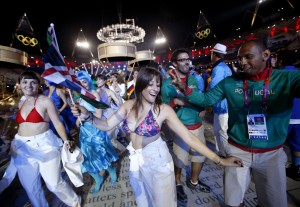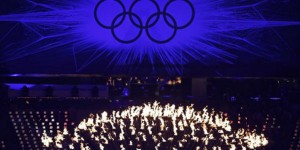‘Greatest show on Earth’ ends; next stop, Rio
LONDON—The melting pot of a city that dazzled for a fortnight finally bid farewell to its third Olympics on Sunday night with a star-studded celebration of pop music and its energetic culture.
In a Summer Games that saw the United States regain its top spot as the best sporting nation in the world and the Philippines extend its Olympic futility, a triumphant London extinguished the flame that for 16 days had lit up the world.
Goodbye London, hello Rio de Janeiro.
British music, one of Britain’s strongest cultural exports over the last 50 years, brought together giants from Queen and Take That to George Michael and the Spice Girls to entertain the real heroes of the 30th Olympiad—the 10,490 athletes.

Portugal’s Nuno Delgado, right, dances with performers during the Closing Ceremony at the 2012 Summer Olympics, Monday, Aug. 13, 2012, in London. (AP Photo/Jae C. Hong)
“Today features the closing of a wonderful Games in a wonderful city,” said Sir Sebastian Coe, an Olympic hero and chief organizer of the sporting extravaganza that defied Britain’s financial crunch.
“For the third time, we were granted the trust of the Olympic movement. Once again we have shown ourselves worthy of that trust. London, we did it right.”
In a showcase of 21st century technology, 10,000 lights transformed London’s architectural highlights, wrapped in monochrome newsprint, into a luminous fun fair as the British Union Jack was reinterpreted more than a dozen times in the field of play.
The infectious beats of “Our House” by Madness flowed into “Because” by the Beatles and to “We Will Rock You” by Queen as performing groups vied for the attention of the 80,000 people at Olympic Stadium.
A pixel screen made up of 70,799 small panels and extending around the audience seating area displayed amazing images that flooded the stadium.
In two memorable segments, sound waves filled the screen as the voice of Freddie Mercury (“Bohemian Rhapsody”) and then of John Lennon (“Imagine”) echoed around the venue.
Barriga’s singular win

GOODBYE LONDON, HELLO RIO. The Olympic rings stand illuminated over the Olympic flame during the Closing Ceremony at the 2012 Summer Olympics, Monday, Aug. 13, 2012, in London. (AP Photo/Alastair Grant)
After the athletes from 204 nations marched into this cacophony of lights and sounds, London’s last goodbye also paid tribute to the Olympics’ 10,000 volunteers and to Britain’s multiracial medal winners, among them Mohamed Farah, the Somali-born 10,000-meter and 5,000-meter champion.
The mayor of Rio de Janeiro received the five-ring flag from International Olympic Committee president Jacques Rogge, and the Brazilian capital’s own four-year countdown to the 31st Games began.
Overpowered by their Chinese hosts in Beijing 2008 (51 golds to 36), the US athletes captured 104 medals this time, including 46 golds. China won 38 golds and Britain 29—its biggest haul in 104 years—for second and third spots.
For the fifth straight Olympics since Atlanta 1996, the Philippine contingent failed to land a medal. The best effort of the country’s embattled 11-member contingent was the singular first-round win by boxer Mark Anthony Barriga.
Skating nuns
The gaudy three-hour farewell mashed up theater, acrobatics and fashion.
Also appearing on stage were Ray Davies, Fatboy Slim, Jessie J, Russell Brand and Eric Idle, who led the crowd in a version of “Always Look on the Bright Side of Life,” while surrounded by skating nuns.
The Who closed the evening with “My Generation.”
It was an elaborate and at times earsplitting spectacle in a stadium built in a borough of east London that had been transformed from a toxic dump into the center of the athletic universe.
The athletes were assembled in the middle of the stadium and were entertained or dumbfounded by the proceedings. These competitors were given cameos at the show, but they provided so many remarkable performances in the last few weeks that picking a single standout was a challenge.
Phelps or Bolt?
One choice was Michael Phelps, who became the most garlanded Olympian in history, after winning four golds and two silvers here, running his career total to 22 medals, 18 of them gold. He was given a special trophy that read “Greatest Olympic Athlete of All Time.”
But somehow, Phelps seemed eclipsed by Usain Bolt, the irrepressible Jamaican sprinter who became the first man to win gold in the 100 and 200 meters at two Olympics and finished off a record-breaking performance in the 4×100-meter relay.
Measured by sheer quantity of bling, Bolt has a fraction of Phelps’ medals. But perhaps because the designation “fastest man on earth” speaks to such an elemental physical feat, or because he celebrates with unequaled brio, Bolt might have made the deepest and most lasting impression here.
At minimum, Bolt joined the pantheon of great athletes, like Ali and Pelé, famous enough to be known by one name.
Women a major story
Others will argue for singular performances, like the 800 won by Kenya’s David Rudisha, who set a world record. Or the American women’s 4×100 relay team, which shaved a half-second from the world record set in 1985 by an East German team.
London will be remembered for these athletes and for some larger themes as well.
Women were a major story, with these Games marking the first time that every country had at least one female athlete. A 16-year-old judo competitor became the first woman from Saudi Arabia to compete in the Olympics, which she did while wearing a variation of traditional Muslim head garb.
The women are latecomers to a long-running trend. At the Seoul Games in 1988, 26 percent of participants were women; in London, 44 percent were.
These Games marked the first time that women outnumbered men on the US team—and the first time American women outperformed the men, too. US women are bringing home roughly 65 percent of the country’s gold medals.
Price of serenity
The Olympics will also be remembered for what did not happen here. There were no security scares, despite hand-wringing about how vulnerable London could be to acts of terrorism.
The serenity came at a steep price, one that could be measured in dollars—roughly $1.5 billion was spent on jets, choppers, snipers and surface-to-air missiles—as well as time.
Even the weather played nice.
The stadium that has witnessed tears and triumphs was transformed for the closing ceremony into a mini-London, with model landmarks including Tower Bridge and St. Paul’s Cathedral on a Union Jack shaped stage.
Actor Timothy Spall dressed as British wartime Prime Minister Winston Churchill recited the same lines from Shakespeare’s The Tempest as in the Games’ opening 16-days ago: “Be not afeard: the isle is full of noises.”
The audience cheered as Prince Harry arrived to represent his grandmother Queen Elizabeth.
Circus-style ceremony
Then the party kicked up a gear.
“Batman and Robin” appeared from an exploding car and Madness belted out “Our House.” A troop of 160 guards from the Household Division Ceremonial State Band joined the arena followed by the Pet Shop Boys singing “West End Girls” and then teen hearthrobs One Direction.
Athletes from the 204 competing nations joined 30 minutes into the ceremony, entering casually rather than parading in their national teams.
Waving flags and proudly displaying medals, the athletes streamed past volunteers in blue bowler hats with light bulbs on top, taking photos of the audience and new friends among the other athletes.
The circus-style ceremony was set to a British soundtrack of the last 50 years, featuring classic songs by the Kinks, the Beatles, Pink Floyd and more, and specially designed “pixel boxes” on every seat provided a spectacular light show.
Back to reality
The Olympic flag was handed to Eduardo Paes, Rio’s mayor, before Rogge described the Games as “happy and glorious” and declared them closed—the words taken from Britain’s national anthem to the queen.
The Olympic Flame was extinguished, fireworks filled the sky, the athletes walked off and Britain prepared to return to the reality of an economic recession temporarily buried in the inside pages of the newspapers.
But one of the great stories of these Olympics was the effect they had on England itself. Triumphalism does not come naturally to this country, where the cultural stock in trade has long been dignity in defeat.
This, let’s not forget, is a nation where one of the most beloved poems is Tennyson’s “Charge of the Light Brigade,” which valorizes a military rout at the hands of the Russians. With a report from Associated Press
